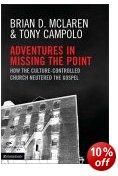Missing the point?
posted by Little Mo | Permalink | 2 comments
Ok, so time to read some emergent literature for myself. And I thought this would be a good one to start with - a critique of the (mostly US) evangelical church by Campolo who I have a lot of time for, and McLaren who is a key ECM figure. Now, I must confess I come to McLaren with some innate prejudice. "A New Kind of Christian" seemed to be something of a misnomer to me for one of his books, because quite frankly liberal Christianity has been round for years. I get irritated with people who dress old ideas up as their own new ideas - McLaren it seems to me feeds largely off the 20th century liberal theology movement which is in no way new. That is not to diss liberal Christians - there are lots of them around, but McLaren didn't invent that "new kind of Christian."
Now I was just going to read this book and review it but I think there's going to be lots of stuff in it - it's going to need more than one post. The book is a series of articles by one of the authors and then a reply from the other - very conversational and emergent I must say.
So first - McLaren starts with "Salvation." His argument, as I follow it, goes like this - we think salvation is about a ticket to heaven. It isn't. In the OT it is largely about liberation from enemies for the people of God. During the exile when this seemed like it was never going to happen some people called the Pharisees came along and said that it was because of the people's sin. McLaren specifically says that this is "the first time" sin comes into the equation. Jesus came and said this wasn't so. Salvation is about being rescued from the cycle of violence, our pattern of hatred and fear, to be a blessing to others. It is about giving us permission to participate in God's mission right now. Plus "of course" the gift of assurance of being with God forever. Jesus does save us from our sins, but by giving us a better way to live.
Campolo agrees that Jesus preached that salvation was primarily for the here and now, but points out that death is an issue we need to address as is the reality of Satan.
There is something very appealing about this. There is something seriously wrong with a Christianity that thinks a prayer prayed is a free ticket to heaven and then doesn't live as a sign of the kingdom each day afterwards. So thumbs up Brian there.
However, something was troubling me. I thought perhaps I was getting defensive as the prefeace to the book warns me not to, because I'll be missing the chance to learn. (The gentle but definite arrogance underlying that warning rubbed me up the wrong way slightly I must admit)
But I kept coming back to the idea that the idea of needing rescue being linked to sin came from the Pharisees. On reflection - it just doesn't. It comes from the Bible - Deutronomy says the exile will happen for that very reason, the prophets make the link in nearly every sentence, sin is the problem. And the REAL problem isn't sin - ie sin=oppression, but rather God's reaction to sin, which puts his people into exile, into the hands of their enemies. The problem of oppression by enemies comes from God's reaction of punishing the people's sin - this stands out of the Old Testament on every page.
Thus when Jesus comes to save us from our sins, it is not merely to get us out of the cycle of wanting to beat our enemies, but to deal with the root problem, God's judgement, and (this is where McLaren is right) for those people to live as God's new community won back to him, their sin dealt with. The emphasis on Hell, which may or may not be missing the point and leading to Christians who are all other worldly, comes from this idea that the central problem Jesus solves is relational; between God and us. It isn't simply that we aren't quite fulfilling our potential as God's blessing to the world. Seeing salvation primarily as the lifting of oppression - the oppression of a power hungry system to live in a new way - leaves God and his feelings about sin out of the equation altogether.
Frankly, evangelising by saying "have an adventurous life where you are part of God's plan" IS very culturally appealing, but talking about salvation in those terms is, it seems to me, missing the point of our far more serious problem.
Now, as I said, I think Brian is right to say that the Christian profession is transformative. But if we make that the central hallmark of salvation we end up saying - "choose a better way of life." The relational, Godward, aspect of salvation is sidelined. That, it seems to me, is to miss the point in a very serious way indeed.


